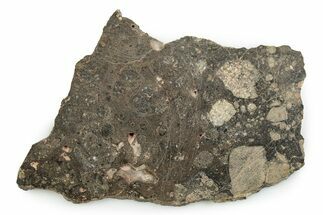This Specimen has been sold.
1.76" Meteorite (7.34 g) Section - Rare Winonaite!
This is a 1.76" wide (7.34 gram) fragment of the winonaite meteorite NWA 13790. Winonaites like this are notable for their highly brecciated mixtures of nickel-iron and stony material: this specimen shows off its features spectacularly, displaying Windmanstätten patterns in its nickel-iron portion among clasts of handsome brown stone.
About NWA 13790 And Winonaite
NWA 13790 is a very unusual kind of achondrite known as a winonaite. Winonaites, named for the type specimen found in Winona, Arizona in 1928, are a kind of primitive achondrite made from the heating and partial melting of chrondritic material, resulting in some unique metamorphic features. They are notable for their equigranular, partially melted chondrules, high nickel-iron contents, and even silicate inclusions similar in composition to those found in iron IAB meteorites. To date, only 54 winonaites are known.
NWA 13790 consists of several stones totaling about 830 grams in weight. It is a dark, coarse-grained mafic rock consisting of mainly olivine and pyroxene, though troilite and some nickel-iron grains can also be found. These features truly shine on a polished slice of this gorgeous meteorite.
Meteoritical Bulletin Database Entry - NWA 13790
NWA 13790 is a very unusual kind of achondrite known as a winonaite. Winonaites, named for the type specimen found in Winona, Arizona in 1928, are a kind of primitive achondrite made from the heating and partial melting of chrondritic material, resulting in some unique metamorphic features. They are notable for their equigranular, partially melted chondrules, high nickel-iron contents, and even silicate inclusions similar in composition to those found in iron IAB meteorites. To date, only 54 winonaites are known.
NWA 13790 consists of several stones totaling about 830 grams in weight. It is a dark, coarse-grained mafic rock consisting of mainly olivine and pyroxene, though troilite and some nickel-iron grains can also be found. These features truly shine on a polished slice of this gorgeous meteorite.
Meteoritical Bulletin Database Entry - NWA 13790
About Achondrites
Achondrites are a type of stony meteorite that lacks chondrules--round grains that aggregate from molten or partially molten droplets in space to form chondrites. Achondrites still contain grains, but their textures are extremely distinct and analogous with igneous processes rather than the chondrule-producing conditions at the beginning of the solar system.
Achondrites make up about 8 percent of all known meteorites. They are almost all regolith breccias, ejected from impacts on larger asteroids and sometimes the moon and Mars. Most are HED (howardite-eucrite-diogenite) in composition, sourced from the asteroid Vesta: it is the second largest asteroid in the Solar System and the only asteroid visible to the naked eye.
Achondrites are a type of stony meteorite that lacks chondrules--round grains that aggregate from molten or partially molten droplets in space to form chondrites. Achondrites still contain grains, but their textures are extremely distinct and analogous with igneous processes rather than the chondrule-producing conditions at the beginning of the solar system.
Achondrites make up about 8 percent of all known meteorites. They are almost all regolith breccias, ejected from impacts on larger asteroids and sometimes the moon and Mars. Most are HED (howardite-eucrite-diogenite) in composition, sourced from the asteroid Vesta: it is the second largest asteroid in the Solar System and the only asteroid visible to the naked eye.
TYPE
Winonaite (Achondrite)
LOCATION
Northwestern Africa
SIZE
1.76 x .61 x .25", 7.34 grams
CATEGORY
SUB CATEGORY
ITEM
#281347
 Reviews
Reviews












